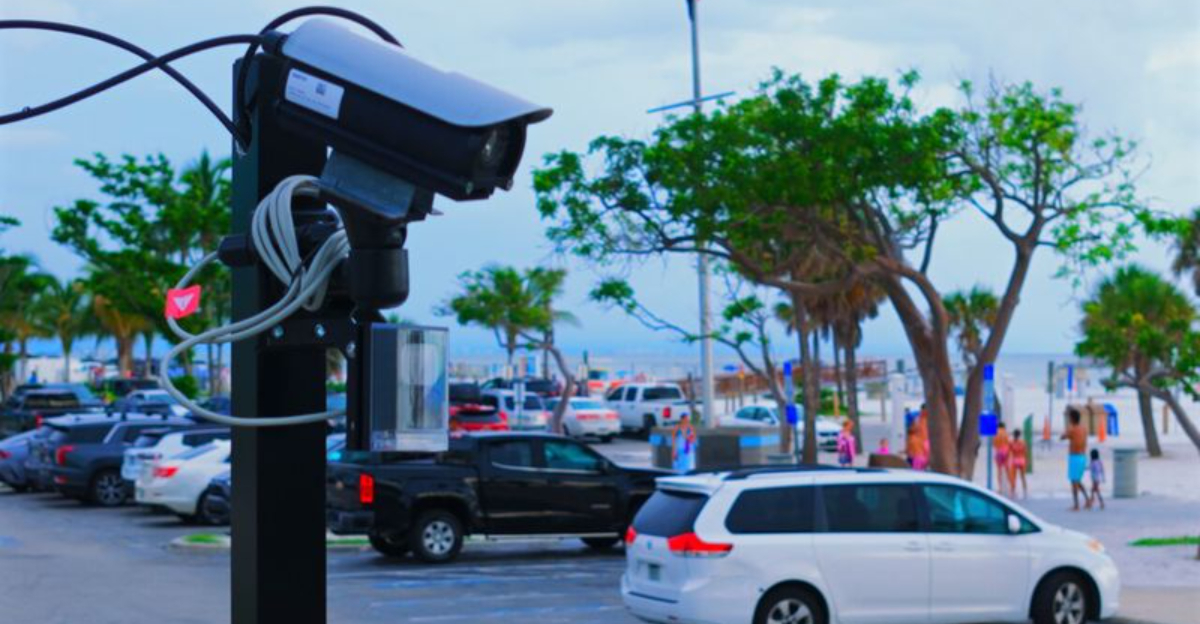
Planning a Florida beach trip? Parking might be trickier than you expect. Recent changes to beach parking rules across the Sunshine State could surprise unprepared visitors with unexpected fees, fines, or even towing. Understanding these new parking regulations before you arrive will save you time, money, and vacation headaches.
1. Florida 511 App Shows Real-Time Beach Parking Availability
Driving in circles hunting for beach parking spots wastes precious vacation time. The Florida 511 Mobile App eliminates this frustration by providing real-time parking availability at major beach destinations.
Beyond traffic updates, the app displays color-coded indicators showing lot capacity percentages. Green means plenty of spaces, yellow indicates filling up, while red warns you to try elsewhere.
The system covers popular destinations from Pensacola to Key West. Download before your trip and check conditions while safely parked, as Florida strictly enforces distracted driving laws with hefty fines for using phones while operating vehicles.
2. The Barnacle Device Traps Illegal Parkers
Franklin County’s latest parking enforcement tool sticks to your windshield like a determined sea creature. This bright yellow device, aptly named “The Barnacle,” can’t be pried off without damaging your vehicle.
Violators must pay a $108 fine via phone to receive the unlock code, then return the device to a designated dropbox. Your $300 deposit gets refunded only after proper return.
Launched in February 2025, this high-tech solution targets illegal beach parking that previously blocked resident access and emergency vehicles.
3. Miami Beach Sends Warning Texts Before Towing
Getting towed just got a little less painful in Miami Beach. The city’s new “Text Before Tow” program gives registered residents a 15-minute heads-up before their illegally parked vehicle gets hauled away.
This grace period allows drivers to dash back and move their cars, potentially saving hundreds in towing fees. The program launched May 2025 after complaints about aggressive towing practices.
Visitors beware – this courtesy only extends to registered Miami Beach residents, so tourists should still follow parking rules precisely.
4. Sunset Beach Eliminates Free Side Street Parking
The days of scoring free parking near Sunset Beach in Treasure Island have disappeared like footprints in the sand. Since July 2024, all side street parking requires payment through the ParkMobile app at $5 per hour.
Locals can purchase annual passes for $45, while visitors face the full hourly rate. City-owned lots offer a slightly better deal at $3.75 hourly.
Smart travelers arrive early morning or late afternoon when spaces become available as day-trippers leave. Remember to set parking alerts on your phone to avoid costly overtime tickets.
5. Volusia County Charges Non-Residents for Beach Parking
January 2025 marked the end of equal-opportunity beach parking in Volusia County. Non-residents now pay $20 daily or $100 annually at off-beach lots that locals access for free.
Residents must register for special passes by providing proof of county residency. The new system aims to reduce overcrowding at popular spots like Daytona and New Smyrna Beach.
Savvy visitors can still find bargains at municipal lots in beach towns, which often charge less than county facilities. Some hotels also offer beach parking passes as part of their stay packages.
6. License Plate Readers Monitor Fort Myers Beach Parking
Big Brother is watching your parking habits at Fort Myers Beach. Lee County installed high-tech cameras at 18 popular beach locations that scan your license plate upon entry and track your payment status.
The system grants a 15-minute grace period, but dawdling beyond that without payment triggers automatic citations. Many visitors get caught when they forget to start their parking session immediately after arriving.
Park rangers no longer need to check windshields for tickets – the cameras do the work. Pay promptly through the mobile app to avoid finding a surprise citation in your mailbox weeks after your vacation ends.
7. Boca Raton’s ParkMobile App Prevents Beach Parking Tickets
Fumbling for quarters at Boca Raton’s beaches is now a thing of the past. The city’s partnership with ParkMobile lets you handle parking payments with a few smartphone taps.
Simply enter the zone number posted on signs near your parking space, select your duration, and confirm payment. Running low on time while still soaking up rays? Extend your session remotely without rushing back to your vehicle.
The app sends helpful countdown alerts when your time nears expiration. This system operates at all Boca beach access points, including the popular Red Reef Park and South Beach Park locations.
8. Dania Beach Doubles Hourly Parking Rates
Sticker shock awaits visitors to Dania Beach’s oceanfront parking areas. Hourly rates jumped from $3 to $5 in October 2023 – a 67% increase that caught many regular beachgoers by surprise.
The city implemented the PayByPhone system, allowing visitors to extend parking sessions remotely. Annual passes represent the best value for frequent visitors, especially Broward County residents who qualify for discounted rates.
Early birds gain advantages beyond cooler temperatures – arriving before 9 AM often means better parking spot selection and potentially shorter payment queues at the automated kiosks that sometimes malfunction during peak hours.
Dear Reader: This page may contain affiliate links which may earn a commission if you click through and make a purchase. Our independent journalism is not influenced by any advertiser or commercial initiative unless it is clearly marked as sponsored content. As travel products change, please be sure to reconfirm all details and stay up to date with current events to ensure a safe and successful trip.